Immigration Health Surcharge 2025: Costs, Rules, Refunds

Planning a UK visa, settlement or citizenship journey? Understanding the Immigration Health Surcharge (IHS) can save you hundreds of pounds and prevent delays. This guide gives you the 2025 rates, who pays, how it is calculated, refund rules, and smart budgeting tips with clear examples.
At a glance: what the Immigration Health Surcharge is
Definition: The immigration health surcharge (IHS) is a mandatory payment for many UK visa applicants that funds access to the National Health Service (NHS) during your stay.
IHS meaning: A healthcare contribution paid upfront with your visa application.
Why it exists: Helps cover NHS costs for temporary migrants.
Who it applies to: Most non-visitor visa routes where you will be in the UK for more than 6 months.
NHS access: Pay the IHS and you can use the NHS largely like a permanent resident from your visa start date (standard NHS charges may still apply).
Where it fits in your journey: You pay IHS at each temporary visa stage on the way to Indefinite Leave to Remain (ILR) and, later, citizenship.
IHS rates in 2025
Standard rate: £1,035 per person per year for most visas.
Reduced rate: £776 per person per year for students, their dependants, and Youth Mobility Scheme applicants. Some under-18 applications also fall under reduced pricing — confirm using the official calculator.
Always check the latest figures on GOV.UK before you apply, as rates can change. See the official IHS rates page and this practical explainer from DavidsonMorris.
Who must pay the IHS and who is exempt
Use this section to quickly determine if the IHS applies to your visa route. Official rules: who needs to pay.
Applicants who typically pay
Skilled Worker (and most work visas) — see Skilled Worker costs.
Partner or Spouse routes (e.g., 33-month initial entry, 30-month extensions).
Student visas and their dependants — reduced IHS rate applies.
Scale-up Worker — see Scale-up costs.
Graduate visa — see Graduate visa costs.
Most dependants of the above routes.
Exempt categories
Visitor visas and permanent residence routes: you do not pay if applying as a visitor or for ILR/citizenship.
Health and Care Worker visa applicants and their dependants are exempt.
EU Settlement Scheme (EUSS) applicants do not pay the IHS.
Outside UK applications for 6 months or less do not pay the surcharge. Note: NHS treatment would be chargeable in most cases if you are not covered by the IHS.
Read the definitive government guidance on who pays and the policy document.
Special cases and edge scenarios
Short visas: If applying from outside the UK for 6 months or less, there is typically no IHS. If applying inside the UK for 6 months or less, a half-year charge may apply (for eligible categories the reduced half-year amount is £388). Always check the GOV.UK calculator.
Switching routes: Switching to a new category usually triggers a fresh IHS calculation at the new route’s rate.
Children turning 18: If a child turns 18 before their next application, the payable rate/category may change. Use the official calculator to confirm.
EUSS outcomes: If granted pre-settled/settled status via EUSS, no IHS applies to that status.
How the IHS is calculated
The IHS is charged in 12-month and 6-month blocks based on the length of permission you are applying for, multiplied by the correct annual rate for your category.
The 6 month rule explained
Count your visa length (the period of permission requested, not your travel dates).
Break it into full years plus any remaining 6-month block.
Multiply the number of years/blocks by the applicable annual rate (standard or reduced).
Outside the UK for 6 months or less: you generally do not pay the IHS. Inside the UK for 6 months or less: a half-year charge may apply for eligible categories (for example, £388 for students/their dependants/under-18 applications).

Worked examples for common visas
33-month Partner/Spouse (entry clearance): 2 years + 6 months + 3 months rounds to three 12/6-month blocks, so charged as 3 years at the standard rate: 3 x £1,035 = £3,105.
Skilled Worker, 3 years: 3 x £1,035 = £3,105.
Skilled Worker, 5 years: 5 x £1,035 = £5,175.
Student, 2 years: 2 x £776 = £1,552 (reduced rate).
Child dependant of a Student, 2 years: 2 x £776 = £1,552 (reduced rate applies to student dependants).
Use the official guidance to verify your figures before paying: how much you pay.
Extensions, curtailments, and switching
Granted less time than requested: You should receive an automatic partial IHS refund for any overpaid period.
Extending mid-route: A fresh IHS is charged for the new grant length (in 6/12-month blocks).
Switching routes: The IHS is recalculated at the new route’s rate; no credit transfer between categories.
When and how to pay the IHS
You pay the IHS during your online visa application. The system calculates the amount and generates an IHS reference number that links to your case.
Inside the UK: Once you receive the payment email, pay within 10 working days.
Outside the UK: Pay within 7 working days of receiving the payment email.
Official guidance: IHS overview and payment.
Sequencing your application and IHS payment
Complete the online visa form until the IHS screen appears.
Confirm visa dates and dependants are correct.
Pay the IHS and note the IHS reference number.
Return to the visa application to pay the application fee and book biometrics.
Avoid pitfalls: Do not submit multiple applications for the same person; this can trigger duplicate IHS charges. If payment fails, wait for the status to reset (often a few hours) before retrying with a different card.
Correcting mistakes
Wrong dates or visa length: Go back to the application, correct the entries, and let the system recalculate before paying.
Incorrect dependant count: Remove or add the dependant on the application screens before reaching the payment page.
Paid the wrong amount: UKVI normally auto-corrects overpayments with a refund after decision. Keep your IHS reference handy.
What the IHS covers and what it does not
After paying the IHS (where required) and once your visa starts, you can use the NHS largely on the same basis as permanent residents. See the policy document.
Accessing NHS services after paying IHS
From when: You can start using the NHS from your visa start date.
GP registration: Register with a local GP, get referrals to hospital care as needed. Our guide can help: Registering with a GP: Newcomer’s Guide to the NHS.
Urgent and emergency care: A&E and urgent treatment access are available; follow-ups may require GP registration.
Regional differences: Prescription charges apply in England but not in Scotland, Wales or Northern Ireland policies (subject to change).
See: NHS entitlement after paying IHS.
Charges you still pay
Prescriptions in England (unless exempt).
NHS dental treatment charges.
Eye tests and glasses costs.
Some vaccinations and assisted conception.
Confirmed on GOV.UK: services you may still pay for.
Refunds, reimbursements, and when you will not get one
Automatic refunds typically occur if:
Your visa application is refused, withdrawn before decision, or void.
You paid too much (for example, UKVI grants less time than you paid for).
There was a duplicate payment for the same person and application.
No refund in common scenarios:
You choose not to use the NHS or depart the UK early after your visa starts.
You switch to a new route after a grant; the old IHS is not transferred.
Your visa is curtailed for reasons such as breaching conditions (beyond any unused period UKVI decides to refund).
Reimbursement schemes: Health and Care Worker visa holders are exempt, not reimbursed. Some health or care workers on other routes may be eligible for reimbursement schemes; always check current rules on GOV.UK.
How long a refund takes and how to chase it
Timing: Many refunds arrive automatically to the original payment method within a few weeks of the decision email.
If delayed: Check spam for the refund email, confirm the card/account is active, and contact UKVI via your application account or the GOV.UK contact routes to escalate if no update after 6 weeks.
Budgeting tips to keep IHS and related costs under control
Plan the full route to ILR: Add up multiple IHS payments across extensions. See our UK Immigration Roadmap and compare major costs in ILR application fee vs UK citizenship cost.
Time your application: Applying for slightly shorter or longer grants can change IHS blocks. Use the GOV.UK calculator before locking your dates.
Avoid duplicates: Submit one application per person to prevent duplicate IHS charges.
Employer costs: If you are sponsored, understand the Immigration Skills Charge so there are no surprises at offer stage.
Prepare early for mandatory tests: Failing the Life in the UK Test can delay ILR or citizenship and create knock-on costs.
A fast win: avoid test retakes with Life in the UK Test App
Many ILR and citizenship applicants feel overwhelmed by the test content. The Life in the UK Test App organizes the official handbook into manageable sessions, with a smart learning assistant (Brit-Bear), over 650 questions with explanations, realistic mock tests (including Hard Mode), and offline access. Users report higher confidence and fewer retakes — saving time and money.
Beat overwhelm: Smart study plans and readiness scores focus your effort.
Practice smarter: Large, explained question bank and exam-like mocks.
Study anywhere: Offline learning on your commute or lunch break.
Avoid delays: Pass first time to keep your ILR or citizenship timeline on track.
Try it now: Download on App Store: iOS | Get it on Google Play: Android
Quick FAQs
Do I pay the IHS for each dependant?
Yes. The IHS is charged per person, per year. Each dependant added to your application has their own calculated amount based on the correct annual rate.
Is maternity care covered by the IHS?
Yes, routine NHS maternity care is covered once your visa starts and you have paid the IHS, though standard NHS charges (like prescriptions in England) may still apply.
Can I use the NHS before my visa start date?
No. NHS access without additional charge begins from the date your visa starts, provided you have paid the IHS if required.
What if I move from England to Scotland or Wales?
Your NHS entitlement continues across the UK, but charges differ by nation (e.g., prescription charges in England vs. free prescriptions elsewhere). Register with a local GP after moving.
Are visitors charged for healthcare?
Visitors do not pay the IHS and are generally chargeable for NHS treatment, often at 150% of cost. Consider travel insurance for short stays.
Next steps and resources
Check your amount: How much you pay.
Understand eligibility and exemptions: Who needs to pay.
Read the policy detail: Immigration Health Surcharge policy.
Plan your settlement path: ILR roadmap and How to get British citizenship.
Prepare early for the Life in the UK Test: Download on iOS or Get it on Android to avoid retakes.